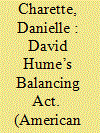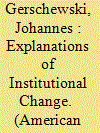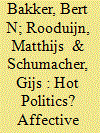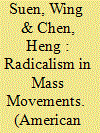|
|
|
Sort Order |
|
|
|
Items / Page
|
|
|
|
|
|
|
| Srl | Item |
| 1 |
ID:
177187


|
|
|
|
|
| Summary/Abstract |
Coalition governance divides policy-making influence across multiple parties, making it challenging for voters to accurately attribute responsibility for outcomes. We argue that many voters overcome this challenge by inferring parties’ policy-making influence using a simple heuristic model that integrates a number of readily available and cheaply obtained informational cues about parties (e.g., their roles in government and legislative seat shares)—while ignoring other cues that, while predictive of real-world influence, are not suitable for heuristic inference (e.g., median party status and bargaining power). Using original data from seven surveys in five countries, we show that voters’ attributions of parties’ policy-making influence are consistent with our proposed inferential strategy. Our findings suggest that while voters certainly have blind spots that cause them to misattribute policy responsibility in some situations, their attributions are generally sensible and consistent with the academic research on multiparty policy making.
|
|
|
|
|
|
|
|
|
|
|
|
|
|
|
|
| 2 |
ID:
177188


|
|
|
|
|
| Summary/Abstract |
Widespread distrust in politicians is often attributed to the way elites portray politics to citizens: the media, competing candidates, and foreign governments are largely considered responsible for portraying politicians as self-interested actors pursuing personal electoral and economic interests. This article turns to the mass level and considers the active role of citizens in disseminating such information. We build on psychological research on human cooperation, holding that people exhibit an interpersonal transmission bias in favor of information on the self-interested, antisocial behavior of others to maintain group cooperation. We posit that this transmission bias extends to politics, causing citizens to disproportionally disseminate information on self-interested politicians through interpersonal communication and, in turn, contributes to distrust in politicians and policy disapproval. We support these predictions using novel experimental studies, allowing us to observe transmission rates and opinion effects in actual communication chains. The findings have implications for understanding and accommodating political distrust.
|
|
|
|
|
|
|
|
|
|
|
|
|
|
|
|
| 3 |
ID:
177176


|
|
|
|
|
| Summary/Abstract |
Both champions and critics of “neorealism” in contemporary international relations misinterpret David Hume as an early spokesman for a universal and scientific balance-of-power theory. This article instead treats Hume’s “Of the Balance of Power,” alongside the other essays in his Political Discourses (1752), as conceptual resources for a historically inflected analysis of state balancing. Hume’s defense of the balance of power cannot be divorced from his critique of commercial warfare in “Of the Balance of Trade” and “Of the Jealousy of Trade.” To better appreciate Hume’s historical and economic approach to foreign policy, this article places Hume in conversation with Machiavelli, Guicciardini, Andrew Fletcher, and Montesquieu. International relations scholars suspicious of static paradigms should reconsider Hume’s genealogy of the balance of power, which differs from the standard liberal and neorealist accounts. Well before International Political Economy developed as a formal subdiscipline, Hume was conceptually treating economics and power politics in tandem.
|
|
|
|
|
|
|
|
|
|
|
|
|
|
|
|
| 4 |
ID:
177178


|
|
|
|
|
| Summary/Abstract |
Being able to hold politicians accountable is the hallmark of democracy, and central to this is the notion that politicians can run for reelection. Most research on reelection incentives compare politicians who are term-limited with those who are not. These studies concentrate mostly on relatively senior politicians in candidate-centered electoral systems. This article leverages a quasi-natural experiment posed by the staggered implementation of the 2014 Mexican Electoral Reform, which lifted an eighty-year-old ban on reelection. The author conducts a difference-in-differences analysis of the hypothesis that reelection encourages legislators to focus more on policies with the highest “electoral yield”—namely, particularistic legislation. Applying a correlated topic model to a new collection of transcripts from 6,890 legislative sessions in 20 Mexican states between 2012 and 2018, this article presents compelling evidence that it does, that the effect is synchronized with the electoral cycle, and that it is larger when the legislators’ political horizons are longer.
|
|
|
|
|
|
|
|
|
|
|
|
|
|
|
|
| 5 |
ID:
177177


|
|
|
|
|
| Summary/Abstract |
Since 1990, nearly 100 countries extended voting rights to citizens living abroad, including 32 in sub-Saharan Africa. However, the actual ability for emigrants to vote in subsequent elections varies widely. Whereas others view diaspora enfranchisement as a signal to emigrant and international audiences, I argue that incumbent parties expand or restrict emigrant voter access depending on party perceptions of political support abroad. I first leverage the multiple reversals over emigrant inclusion in South African elections since 1994 to illuminate how changing dynamics between an incumbent party and citizens abroad shape emigrant voter access. I further test my argument with an original dataset covering multiple dimensions of external voting in every African election where emigrants had voting rights from 1990 to 2015. I find a robust relationship between emigrant voter access and diaspora support for the incumbent party.
|
|
|
|
|
|
|
|
|
|
|
|
|
|
|
|
| 6 |
ID:
177185


|
|
|
|
|
| Summary/Abstract |
Previous research on institutional change has concentrated on two types of explanations. On one hand, the dualism of path dependency and critical junctures has advanced our understanding of how institutional change occurs due to sudden exogenous shocks. On the other hand, more recent critiques have established a better understanding of endogenous, gradual change. This article is motivated by observations that current research tends to overlook what I call the “missing diagonal.” I argue that we need to disentangle the sources of a cause (exogenous vs. endogenous) from its time horizon (sudden vs. gradual). By cross-tabulating these two dimensions, the proposed typology of institutional change explanations is able to capture complex multilayered as well as sequential arguments of institutional change. The typology urges scholars to be more precise with their social science language of erosion and decay, while serving as a generator for an innovative research agenda on endogenous ruptures.
|
|
|
|
|
|
|
|
|
|
|
|
|
|
|
|
| 7 |
ID:
177173


|
|
|
|
|
| Summary/Abstract |
As government welfare programming contracts and NGOs increasingly assume core aid functions, they must address a long-standing challenge—that people in need often belong to stigmatized groups. To study other-regarding behavior, we fielded an experiment through a text-to-give campaign in Greece. Donations did not increase with an appeal to the in-group (Greek child) relative to a control (child), but they were halved with reference to a stigmatized out-group (Roma child). An appeal to fundamental rights, a common advocacy strategy, did not reduce the generosity gap. Donations to all groups were lower near Roma communities and declined disproportionately for the Roma appeal. Qualitative research in 12 communities complements our experiment. We conclude that NGO fundraising strategies that narrowly emphasize either in-groups or out-groups, or fundamental rights language, may not be as effective as broader appeals, and we discuss implications for public goods provision in an era of growing nationalism.
|
|
|
|
|
|
|
|
|
|
|
|
|
|
|
|
| 8 |
ID:
177181


|
|
|
|
|
| Summary/Abstract |
Canonical theories of opinion formation attribute an important role to affect. But how and for whom affect matters is theoretically underdeveloped. We establish the circumplex model in political science as a theory of core affect. In this theory unconscious emotional processes vary in level (arousal, measured with skin conductance) and direction (valence, measured with facial electromyography). We theorize that knowledge, attitude extremity, and (in)congruence with political rhetoric explain variation in affective responses. In a large lab study (N = 397), participants watched video clips with left-wing or right-wing rhetoric on prominent issues. We find that people with extreme attitudes experience more arousal in response to political rhetoric and that political rhetoric incongruent with prior attitudes evokes negative affect. Moreover, we show that affective responses lead to opinion change, independent of self-reported emotions. We conclude by setting a research agenda for the alignment between affective and cognitive components of emotions and their consequences.
|
|
|
|
|
|
|
|
|
|
|
|
|
|
|
|
| 9 |
ID:
177182


|
|
|
|
|
| Summary/Abstract |
This study explores why, at critical moments, governments may withhold vital information from the public. We explain this phenomenon by what we call idiosyncratic events, or events independent of the information receiver’s state-contingent payoff functions. Idiosyncratic events often influence the receiver’s belief on the sender’s performance. If such events are correlated with the events determining the payoff functions, the sender may withhold information so as to improve his image. This result may be applied to the manipulation of information regarding a number of recent real-world phenomena, including the Fukushima nuclear accident in 2011 and the ongoing outbreak of COVID-19.
|
|
|
|
|
|
|
|
|
|
|
|
|
|
|
|
| 10 |
ID:
177179


|
|
|
|
|
| Summary/Abstract |
Has the decline in traditional sources of local news contributed to the nationalization of U.S. elections? I hypothesize that local news coverage mitigates nationalization by providing voters with information that allows them to assess down-ballot candidates separately from their national, partisan assessment. The geography of media markets places some voters in a neighboring state’s market and others in in-state markets. I demonstrate that residents of in-state markets have access to vastly more local television news coverage of their governor and U.S. senators, and this increased coverage translates into greater knowledge of these officeholders. Further, access to in-state television news substantially increases split-ticket voting in gubernatorial and senatorial races. Supplementary analyses provide strong evidence that the estimated effects are not the result of unobserved differences between residents of in-state and out-of-state media markets. These results imply that local news coverage attenuates the nationalization of elections even in the present polarized context.
|
|
|
|
|
|
|
|
|
|
|
|
|
|
|
|
| 11 |
ID:
177172


|
|
|
|
|
| Summary/Abstract |
Does liberal democracy require a strict separation between state and religion? In Anglophone liberal political theory, the separationist model of the First Amendment of the US Constitution has provided the basic template for the rightful relationship between state and religion. Yet this model is ill-suited to the evaluation of the secular achievements of most states, including India. This article sets out a new framework, minimal secularism, as a transnational framework of normative comparison. Minimal secularism does not single out religion as special, and it appeals to abstract liberal democratic ideals such as equal inclusion and personal liberty. Actual debates about secularism in India are shown to revolve around these ideals. The study of recent Indian controversies—about the Uniform Civil Code, the status of Muslims, and the rise of BJP nationalism—also sheds light on some blind spots of Western secularism and the conception of sovereignty and religion it relies on.
|
|
|
|
|
|
|
|
|
|
|
|
|
|
|
|
| 12 |
ID:
177183


|
|
|
|
|
| Summary/Abstract |
Because primary education is often conceptualized as a pro-poor redistributive policy, a common argument is that democratization increases its provision. But primary education can also serve the goals of autocrats, including redistribution, promoting loyalty, nation-building, and/or industrialization. To examine the relationship between democratization and education provision empirically, I leverage new datasets covering 109 countries and 200 years. Difference-in-differences and interrupted time series estimates find that, on average, democratization had no or little impact on primary school enrollment rates. When unpacking this average null result, I find that, consistent with median voter theories, democratization can lead to an expansion of primary schooling, but the key condition under which it does—when a majority lacked access to primary schooling before democratization—rarely holds. Around the world, state-controlled primary schooling emerged a century before democratization, and in three-fourths of countries that democratized, a majority already had access to primary education before democratization.
|
|
|
|
|
|
|
|
|
|
|
|
|
|
|
|
| 13 |
ID:
177184


|
|
|
|
|
| Summary/Abstract |
The origins of voter preferences about the vertical distribution of political power in federal systems are not well understood. I argue that negative historical experiences with higher-level governments can raise demands for both exit strategies and a decentralization of power, but also for upward integration. I specify conditions when delegating power upwards, for example, from the nation-state to a supranational level or international organization, can better serve the purpose of constraining nation-state actions to overcome history. Empirically, the quasi-random division of the French regions Alsace and Lorraine allows estimating differences in support for integration with a spatial regression discontinuity design. More negative exposure to nation-state actions causes persistently higher support for European integration in three referenda and less Euroscepticism in EU elections. Survey evidence supports exit and integration as two complementary alternatives. Both options can serve the purpose of moving power away from the government level associated with negative historical experiences.
|
|
|
|
|
|
|
|
|
|
|
|
|
|
|
|
| 14 |
ID:
177180


|
|
|
|
|
| Summary/Abstract |
Despite the rapid growth of online political advertising, the vast majority of scholarship on political advertising relies exclusively on evidence from candidates’ television advertisements. The relatively low cost of creating and deploying online advertisements and the ability to target online advertisements more precisely may broaden the set of candidates who advertise and allow candidates to craft messages to more narrow audiences than on television. Drawing on data from the newly released Facebook Ad Library API and television data from the Wesleyan Media Project, we find that a much broader set of candidates advertises on Facebook than television, particularly in down-ballot races. We then examine within-candidate variation in the strategic use and content of advertising on television relative to Facebook for all federal, statewide, and state legislative candidates in the 2018 election. Among candidates who use both advertising media, Facebook advertising occurs earlier in the campaign, is less negative, less issue focused, and more partisan than television advertising.
|
|
|
|
|
|
|
|
|
|
|
|
|
|
|
|
| 15 |
ID:
177189


|
|
|
|
|
| Summary/Abstract |
Asymmetric information and diverse preferences for reform create an agency problem between opposition leaders and citizens. Dissatisfied citizens are unsure of how bad the current situation is but infer this information from the scale of the leader’s reform proposal. Because radical leaders have an incentive to exaggerate and mislead, to command credibility, they must paradoxically radicalize the proposal further as a way of signaling the necessity of change. Radicalism motivated by signaling is costly, as it reduces a movement’s chances of success. This mechanism also contributes to leadership radicalization when the leaders of movements arise as a compromise among diverse interests.
|
|
|
|
|
|
|
|
|
|
|
|
|
|
|
|
| 16 |
ID:
177186


|
|
|
|
|
| Summary/Abstract |
This paper investigates party use of seniority systems to allocate nominations for elected and appointed offices. Such systems, which can regulate party members’ access to offices at multiple levels of their careers, are defined by two main rules or norms: an incumbent re-nomination norm and a seniority progression norm. Using comprehensive electoral and candidate data from Norwegian local and national elections from 1945 to 2019, we find systematic patterns consistent with these two norms. Our work illuminates an institutional aspect of candidate selection that the current literature has ignored while noting some of the important consequences of seniority-based nominations for party cohesion and stability.
|
|
|
|
|
|
|
|
|
|
|
|
|
|
|
|
| 17 |
ID:
177175


|
|
|
|
|
| Summary/Abstract |
The UN is intimately involved in efforts to restore the rule of law in conflict and postconflict settings. Yet despite the importance of the rule of law for peace, good governance, and economic growth, evidence on the impact of these efforts is scant. I develop a theory to explain when UN rule-of-law reform is likely to succeed, then test the theory using original datasets capturing the number of civilian personnel deployed to each UN mission in Africa, the number of personnel assigned specifically to rule-of-law-related tasks, and the extent and nature of actual rule-of-law-related activities in the field. The correlation between UN presence and the rule of law is weak while conflict is ongoing, but robustly positive during periods of peace. The relationship is stronger for civilian than uniformed personnel, and is strongest when UN missions engage host states in the process of reform.
|
|
|
|
|
|
|
|
|
|
|
|
|
|
|
|
| 18 |
ID:
177174


|
|
|
|
|
| Summary/Abstract |
This paper investigates how counterterrorism targeting terrorist leaders affects terrorist attacks. This effect is theoretically ambiguous and depends on whether terrorist groups are modeled as unitary actors or not. The paper exploits a natural experiment provided by strikes by Unmanned Aerial Vehicles (drones) “hitting” and “missing” terrorist leaders in Pakistan. Results suggest that terrorist groups increase the number of attacks they commit after a drone “hit” on their leader compared with after a “miss.” This increase is statistically significant for 3 out of 6 months after a hit, when it ranges between 47.7% and 70.3%. Additional analysis of heterogenous effects across groups and leaders, and the impact of drone hits on the type of attack, terrorist group infighting, and splintering, suggest that principal-agent problems—(new) terrorist leaders struggling to control and discipline their operatives—account for these results better than alternative theoretical explanations.
|
|
|
|
|
|
|
|
|
|
|
|
|
|
|
|
|
|
|
|
|